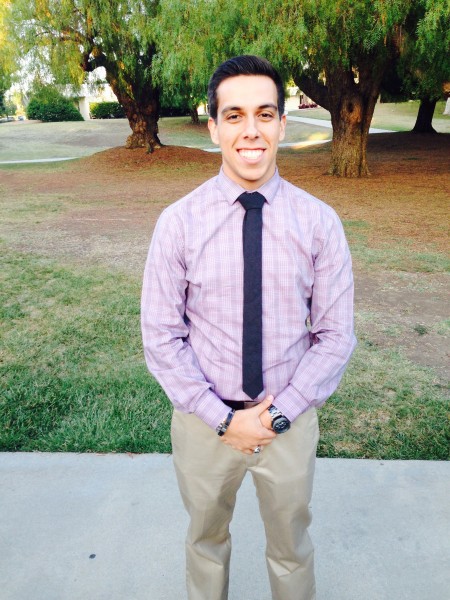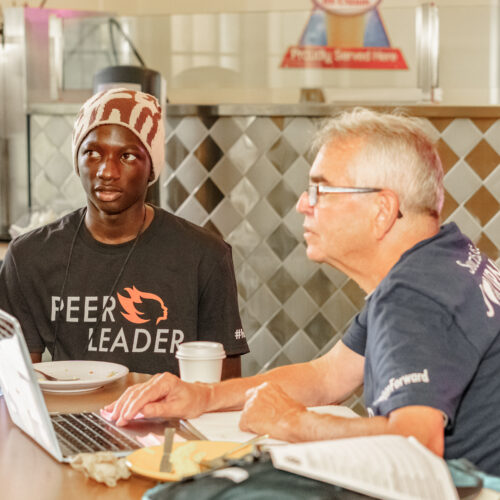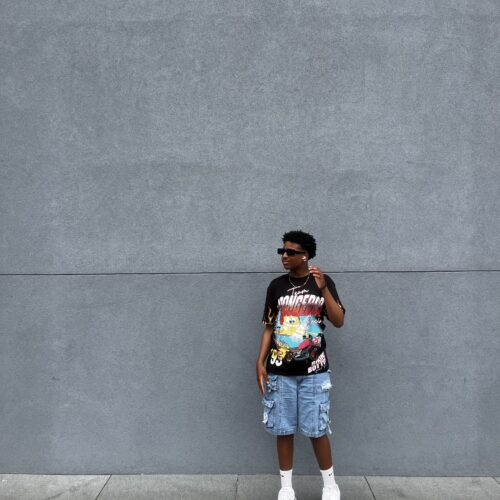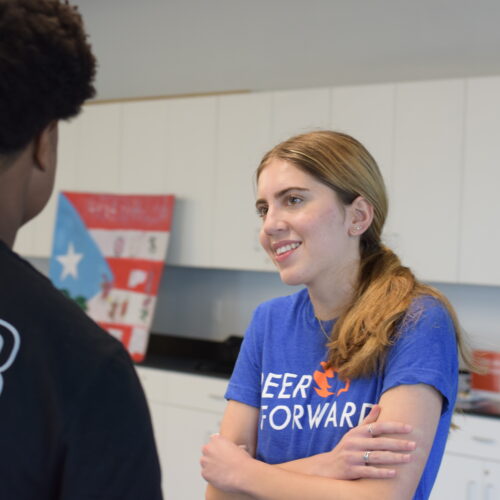PeerForward alumni have followed many career paths and found much success. Here, Ramon Gomez shares his journey.
When did you become a Peer Leader? What was your summer workshop experience like?
I had the great fortune of becoming a Peer Leader in the summer of 2010 entering my senior year at Inglewood High. My workshop took place at the University of Redlands, where, for the first time in my life, I was able to get a glimpse of what it would be like to be away from home and be independent, both of which came in handy when I entered undergrad at UCLA. What definitely stood out about my workshop was the energy and charisma of the Alumni Leaders – they provided an extra spark that kept everyone going and taught me how the greatest of mentors are the ones who are the most authentic, unique and honest. I also loved the intimacy, community, and unity that the Rap Sessions created amongst all the Peer Leaders. They really set the foundation for creating lasting friendships beyond the four days that I still cherish today. It’s amazing to witness the power of utter emotional vulnerability and honesty – as we can sometimes get too wrapped up in trying to retain an unbreakable front, which stops us from being in touch with our emotions and acknowledging not just our trials and tribulations, but also our triumphs and accomplishments.
How did PeerForward help you prepare for college and influence your college experience?
PeerForward helped in my preparation for college by exposing me to the application process earlier and helping me make conscious and informed decisions about how I would be able to fund my education, through self-advocacy activities like “Tower of Power.” This proved beneficial not only for my academic career, but also as I started to develop professional and interpersonal skills. My Writing Coach helped me identify the value within my experiences, both personal and academic, which ultimately helped me find my voice and be comfortably with sharing my story. PeerForward also played a critical role in shaping my college experience as they made me conscience of the assistance and mentorship that students like myself, who did not come from the most fortunate of backgrounds, need in order to make the most out of the college experience. I was inspired to play a role in addressing these disparities on my own campus. When I got to UCLA, not only did I develop research projects that focused on eliminating achievement gaps within urban communities, but I also became active in tutoring and mentoring programs with local LA high schools to engage with students like myself. I aim to embody the very mission that PeerForward stands for – giving all students from all backgrounds the opportunity to obtain a higher education.
What obstacles or challenges did you have to overcome in order to get to college?
One of the biggest internal obstacles that I had to overcome to get to college was my self-confidence. I had to believe in myself in order to prove that a young Latino from a socio-economically disadvantaged background could be capable of not only making it into a four-year university, but also make a name for himself by investing in my college experience once there. PeerForward played a huge role in helping me develop that confidence. It was a privilege to have Alumni Leaders, Writing Coaches, College Coaches and Rap Directors take the time to instill their belief in me and provide me with reassurance that I was capable of anything. Externally, the biggest challenge I had to overcome was being able to afford the cost of an education and not letting that discourage me from making the investment to continue my education – but with the proper information I received at my workshop, I was able to obtain scholarships that ended up fully funding my way through UCLA.
How did you and your fellow Peer Leaders help create a college-going culture?
My fellow Peer Leaders and I worked on developing a college-going culture by instilling the idea of going to college to students around our campus in fun, creative and engaging ways. Every week we shared upcoming deadlines for applications and scholarships via the morning announcements to the entire school. During this time, we also acknowledged the seniors who were recently accepted to any college/university they applied to or if anyone was awarded scholarships. Throughout the year, we held FAFSA workshops in order to assure that all the seniors at our high school were applying for financial aid. Additionally, we ran campaigns to raise awareness on the financial aid that’s left on the table because students don’t apply and match students up with specific colleges/universities based on academic needs and interests.
What campus activities are you currently involved in?
Some of the campus activities that I was involved in throughout my time at UCLA include the symphonic band, a tutoring program for elementary and middle school students called Project Literacy, a Latino-based fraternity called Gamma Zeta Alpha where I held leadership positions as the chapter’s Sergeant at Arms and Outreach Chair for our Youth Peace Conference. The Conference was all about raising funds to take students from all around the greater Los Angeles area to UCLA’s campus, where we provided educational workshops to demystify the college application process and gave the students a glimpse of what the college experience is like. I was also active in educational research labs including the High School Diversity Project and the CHOICES Project, where I worked and served as a research assistant on projects that focused on addressing issues related to minorities in higher education including underrepresentation, lack of mentorship, outdated school resources, and a lack of a college-going culture on their campuses.
What do you plan to do after college?
After UCLA, I am headed to the University of Chicago to start a five-year Ph.D. program in Comparative Human Development. I’ll be focusing my research on discovering how and why certain students of color develop the resiliency and desire to pursue a college education despite daunting factors in their communities, such as street violence, crime, lack of role models/mentoring figures, and poverty. Upon completion of my Ph.D. program, I intend on working within the non-profit field in order to serve schools directly and develop mentoring programs that provide the resources needed to develop a college-going culture at schools within urban communities.
What advice do you have for high school students who are on the fence about going to college?
It is easier in life to always see ourselves as lesser, and not acknowledge the greatness that we are truly capable of achieving if we make the sacrifice, invest the time, and give our absolute all in order to become the person we believe we can be. We can all have the future we are entitled to – but we have to earn it. It takes true character and heart in order to take chances and put ourselves out there to defy every negative statistic that has been advertised to diminish our confidence. The realest gold is always tested in the heaviest of fires, and if you can realize the power and importance of investing in yourself, with the first step being able to have the courage to pursue knowledge and consciousness through a college education, then you’ll realize how golden you truly are. The emotional reward that comes with the success that awaits you after taking that step forward to go to college is so surreal and priceless, it’s something truly worth fighting for.












